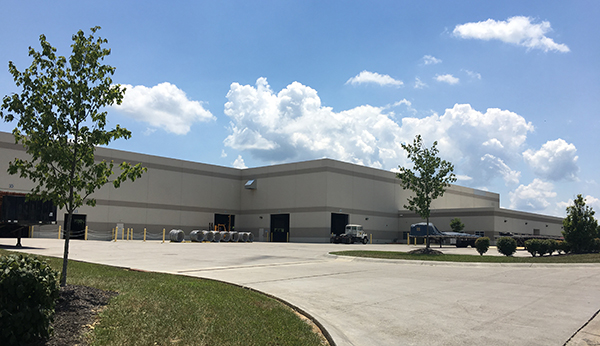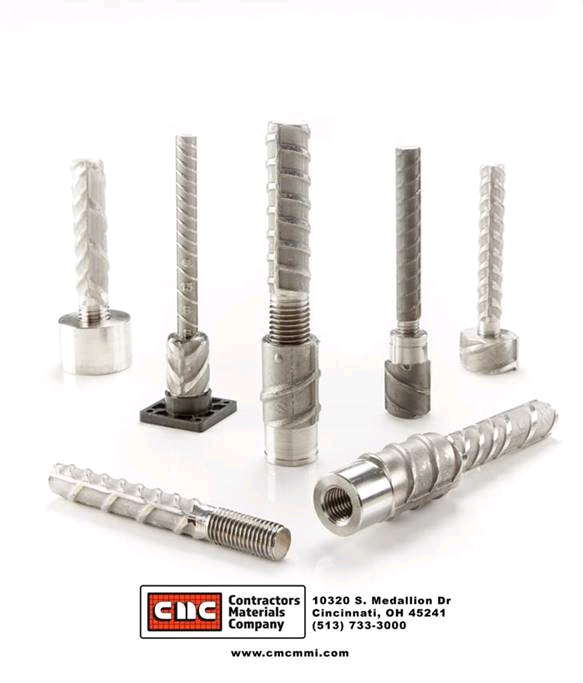4 Generations of Customer Service

The 3-year old, 70,000 square foot home of Corrosion Resistant Reinforcing in Walton, KY, is capable of producing #3 through #11’s from stainless coil up to 60 feet in continuous monolithic straight lengths..
There are not many companies still in business more than 100 years after they started. Yet, the four-generation, family-owned Contractors Materials Company in Cincinnati is celebrating its 111th anniversary. William H. Luken Sr. founded the company in 1907 during the presidency of Theodore Roosevelt. At the time, automobiles were gaining popularity and the business primarily focused on the supply of granite paving stones and curbs for city streets. During the late 1940s, William Jr. and his brother, Robert, joined their father in the business, which added additional concrete paving accessories and 20-foot small diameter reinforcing bars to their inventory. In December 1977, William (Bill) H. Luken III began working at Contractors Materials Company. On April 1, 1978, Bill became a principal in the organization after his father’s retirement. After his uncle’s retirement in December, 1980, Bill began to add other concrete construction products and accessories to the company’s inventory mix, which now included rebar fabrication. During his tenure, Contractors Materials expanded operations with new, larger, and more up-to-date equipment and related facilities to help meet the needs of their customer base.
In 1989, they expanded again with a sister company, MMI of Kentucky, housed in a new 25,000-square-foot facility in Lexington. MMI primarily provides the same product mix as Contractors Materials on a somewhat smaller scale. Their market includes highway and bridge paving contractors and specialty concrete contractors in Kentucky and Northern Tennessee.
Almost 10 years ago, when Bill was considering retirement, an ownership transition was offered to Bill’s daughter, Megan, and her husband, Rob Faircloth. Rob has been with the company nearly nine years. Total Luken ownership was transferred to Rob, Megan, and their son, Luke Faircloth, in June 2012.
A couple of years before Rob joined the CMC/MMI team, the company realized an opportunity to begin fabricating stainless steel reinforcing. Initially, the stainless steel rebar was fabricated at their Cincinnati location. It was soon evident that more space was needed, and a 60,000-square-foot building was leased for the sole purpose of fabricating stainless steel rebar. However, the leased facility did not provide efficient material handling. Rob then began to look for a suitable location to build a new facility. The decision was made to build in Walton, Kentucky, and to also form a new company, Corrosion Resistant Reinforcing (CRR). The Walton location is only 35 miles from their main stainless steel supplier and is located close to several major highway interchanges near the Ohio/Kentucky border.
In March 2015, CRR moved into a new 70,000-square-foot concrete tilt building in Walton for the exclusive purpose of fabricating stainless steel rebar. During the initial years of fabricating stainless rebar, it soon became evident that an exclusive facility was needed to eliminate any contamination caused by carbon rebar fabrication. According to Bill, “Having the least bit of carbon debris on our stainless product can cause the inspector to reject the bars at the jobsite.” He continues, “By maintaining a clean carbon contaminant-free environment in our (stainless) shop, we virtually eliminate expensive rejected products at the jobsite.”
CRR generally fabricates every bar from stainless rebar coils. They prefer coiled rebar for several reasons. First, like carbon bar, remnants and expensive scrap are reduced. Second, because most stainless mills are typically limited to 12 meters in straight lengths, CRR can provide continuous monolithic lengths up to 60 feet for #3 through #11 bar. Also, it’s more productive and economical for the stainless mill to pickle 3,500 pound coils than straight lengths. Additionally, the mills generally offer a discount for purchasing stainless bar in coil.
CRR is proud of the couplers they developed for stainless steel reinforced construction projects. It was Rob’s idea to make couplers out of stainless steel rebar; this way the couplers have the same chemical make-up as the fabricated steel. The couplers have been tested and approved by numerous states. CRR also produces rolled thread on the male bar they supply with their couplers. In addition to matching chemistries and possible heats, the deformations on their couplers help with reduced isolated slippage when in place.
Stainless reinforcement has been used extensively and successfully in Europe and the Middle East for years. Only recently has the US become more interested in using stainless steel rebar in the interest of its life cycle costing. The majority of CRR’s stainless rebar is used for, but not limited to, highway and bridge projects throughout the US and Canada. Despite being considerably more expensive up front, in the long run, stainless has a considered lifespan of nearly 100 years in reinforced concrete design before it requires major restoration, according to Bill.
CMC, MMI, and CRR use a variety of aSa modules from Estimating to Rebar Financials at all of their locations. According to Bill, one of the major keys to success has been the use of aSa Optimized Shearing. While they own a license for aSa Material Tracking and other barcoding solutions at only the CRR site, a recent inventory of materials has proven its value. “We recently conducted our mid-year inventory at CRR using aSa’s barcoding solutions and saved approximately 50% of the man hours it would have taken without using aSa,” says Bill. He continues, “For stainless rebar, material tracking is extremely important. Because of our success and experience with aSa Material Tracking at CRR, we are currently in the process of implementing it at Contractors Materials and will eventually bring MMI into the Material Tracking fold!”
aSa Material Tracking uses barcode scanning technology to record every step of the fabrication process, including the date and time of each operation and the persons responsible for all stages of producing and shipping an item. This real-time record provides an extra level of quality assurance in the shop. Material Tracking also helps fabricators make smart decisions based on employee and machine productivity rates. When used with Bundle Inventory, heat information is automatically associated to each fabricated item. When combined with aSa Scheduling, Production, and Load Tracking modules, employees get all the information they need to efficiently plan, execute, and follow up on material fabrication and delivery.
On July 28, 2018, CRR passed its first Wiss Janney Elstner inspection for the CRSI “Standard Practice for Stainless Steel Reinforcing Facilities.” CRR/CMC has been working on the program for the past five years. This standard is recognized by ANSI and is very similar in structure to the CRSI/ANSI standards program that governs the epoxy coated rebar industry. Salit Specialty Rebar, another stainless producer, also passed inspection for the new standard. The program will soon be launched with a press release to all US Department of Transportation offices, Canadian Ministries of Transportation, and others within the engineering community.

CRR produces stainless couplers from the same heat as the fabricated bars to ensure consistent chemistry requirements for each job. The deformations on their couplers also help prevent isolated slippage.